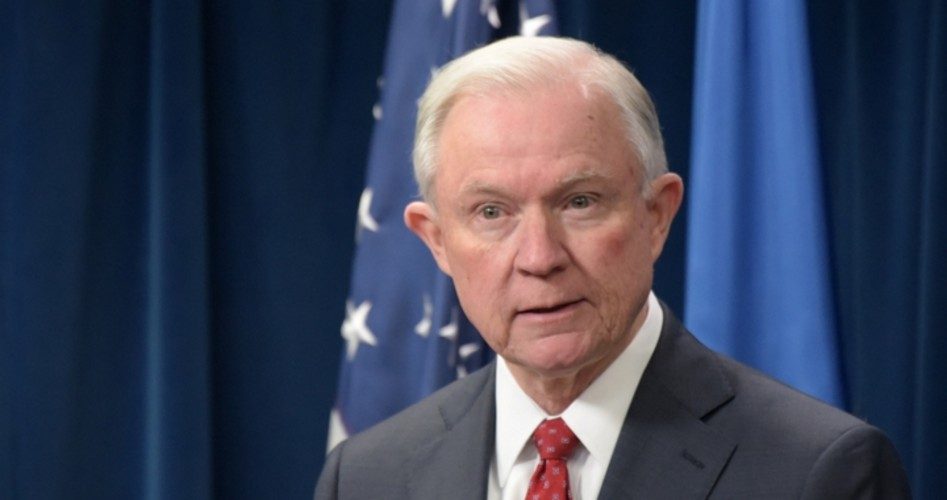
Although he remains personally opposed to marijuana legalization, Attorney General Jeff Sessions (shown) indicated last week that he is not intent on cracking down on marijuana growers, sellers, and users in states where the drug is legal.
In an April 29 meeting with governors of four legal-marijuana states, Sessions strongly hinted that the Justice Department had higher priorities than enforcing federal cannabis laws in such states, according to Colorado Governor John Hickenlooper (D), who requested the meeting.
“He certainly was very direct and clearly said they’ve got a lot of priorities,” Hickenlooper told MSNBC’s MTP Daily. “And, at one point, he said, ‘Well, you haven’t seen us cracking down, have you?’ I said, ‘No.’”
According to the Denver Post:
Hickenlooper laid out the basics, noting that he worked against legalization here, but that he believes Colorado lawmakers and regulators have in place a good system that is getting better. The governor noted that we haven’t seen a rise in teenage use of the drug, that emergency room visits have decreased as laws regulating edibles have made the products safer and that the state worked this legislative session to tighten loopholes in grows that have seen large amounts of pot slipping into other states that haven’t legalized.
Hickenlooper said Sessions “certainly listened” to what the governors had to say, and while the attorney general “couldn’t have been more emphatic” about his opposition to marijuana legalization, “he didn’t give me any reason to think that he is going to come down and suddenly try to put everyone out of business.”
That is reassuring news for the cannabis industry, which has existed in something of a legal limbo ever since states began legalizing the drug. “Medical marijuana is legal in 28 states and Washington, D.C., where it is also legal for recreational use,” reported the Daily Caller. “Voters in Maine, Nevada, California and Massachusetts all approved measures to legalize marijuana for recreational use on Election Day. Nearly 20 percent of Americans now have access to legal pot.”
Marijuana remains illegal at the federal level, so the Justice Department could choose to prosecute people in legal-marijuana states for violating that prohibition. However, since 2013 the department has operated under a memorandum from then-Deputy Attorney General James Cole that essentially directed federal prosecutors to take a hands-off approach to enforcing federal marijuana laws against cannabis producers, sellers, and consumers in legal-marijuana states as long as those individuals and businesses remained in compliance with state law.
Sessions said in March that he thinks the policies outlined in the Cole memorandum are largely “valid” and that while he might “have some different ideas,” the department doesn’t have the resources to enforce federal cannabis laws, which have traditionally been enforced primarily by state and local police.
“He’s obviously reviewing the Cole (Memo),” Hickenlooper told the Cannabist. “(They’re working on) a version of that that makes sense for this administration. We’ll have to see how far they go.”
Of course, what “makes sense for this administration” may change from day to day. As with so many other issues, “the administration has sent mixed messages on pot-legal states,” observed the Post. “On the campaign trail Trump said he would leave the states alone. But White House spokesman Sean Spicer has said that there would be greater enforcement on recreational sales.” And, as always, “President Donald Trump could get involved in unpredictable ways.”
“While we still don’t know exactly how closely the administration will stick to President Trump’s clear campaign pledges to respect state marijuana laws, [Sessions’ recent remarks are] a positive signal,” Tom Angell, chairman of the Marijuana Majority, told the Daily Caller. “The fact is, legalization is working well in states that have enacted it, and a growing majority of the public supports ending prohibition.”
“It would be a huge mistake — policy-wise and politically — for the Justice Department to try to reverse the course of history on marijuana,” Angell added, “and it seems like the attorney general might be starting to realize it.”
Still, relying on the good graces of the attorney general and easily revocable memos is hardly the best way to ensure stability and the rule of law. As Sessions pointed out during his confirmation hearings, when he appeared to take a harder line against legal weed, Congress has prohibited the possession and distribution of marijuana in every state, “so if that’s something that’s not desired any longer, Congress should pass a law to change the rule.” Otherwise, the option to prosecute under that law remains open.
Better yet, Congress should recognize that it has no constitutional authority to ban marijuana — or any other drug — and simply repeal all federal drug laws, letting states be the final arbiters of which substances their citizens may possess, produce, and peddle. In the meantime, Sessions ought to decline to enforce those same laws out of deference to his oath of office, in which he swore to “support and defend the Constitution of the United States.” The War on Drugs, after all, is one of the primary reasons our constitutional liberties are going to pot.
Photo: Attorney General Jeff Sessions



